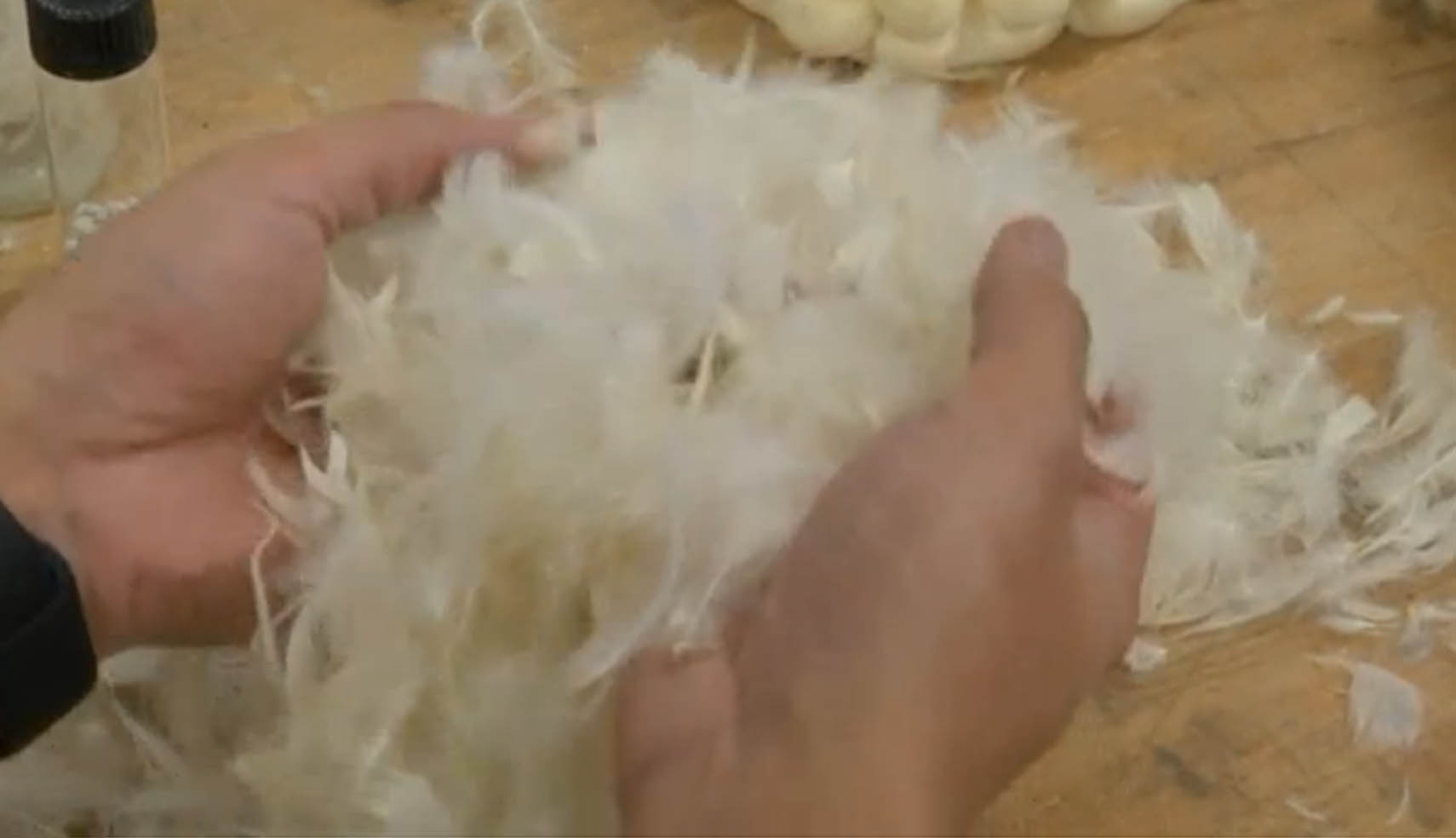
Each year Britain processes more than 945 million white-feathered broiler chickens, the type found in our supermarkets and used by fast-food chains. That’s a lot of leftover feathers. Two PhD students from Imperial College London are working on a method to turn this chicken feather waste into a useful product.
Elena Dieckmann from the Dyson School of Design Engineering, alongside Ryan Robinson from the National Heart and Lung Institute, founded start-up Aeropowder in early 2016.
Most feather waste currently ends up in landfill or is turned into a low-value animal feed which Dieckmann says is squandering an abundant and sustainable material that could serve a real purpose.
“Feathers are a real wonder material. They are designed by nature to protect birds from really harsh environments. So they are super lightweight, they’re thermally insulating, they’re water-repellent, bio-degradable. So, it’s a really great material. And our idea was how can we actually capture those properties and use them for novel applications that can help humans as well,” Dieckmann told Reuters.
She added: “On a weekly basis we create 2,000 tonnes of feather waste in the UK. And on an annual basis we eat 945 million chickens, so you can basically add up how much — over 100,000 tonnes of feather waste on a yearly basis that are mostly chicken feathers.”
In the lab, they tested a variety of methods for working with feathers, which are primarily composed of the protein keratin — the same substance that gives human fingernails and hair their durability. Experiments included freeze drying, burning, and braiding the feathers.
It was during this process that they focused on the fact that feathers are particularly effective insulators. Their prototype design was a thermal insulation product that incorporated feathers into conventional insulation material and won the team £20,000 (25,400 USD) at the Mayor’s Entrepreneur competition in 2016. While they’ve gone on to develop a range of other prototypes that harness the natural properties of feathers; it’s the home insulation market that they want to crack.
“We’re starting with a really great fantastic material to begin with. So we don’t want to do a lot of processing, a lot of chemicals. We want to try and preserve those properties as well as possible by breaking down the feathers into our Aeropowder,” said Robinson. “We’re really optimising the process now and making sure we can do it as sustainable as possible.”
Dieckmann told Reuters they’ve have a patent pending on a conversion process that transforms feathers into a form that can be used to create products that can replace conventional synthetic insulation commonly used in home insulation. One example is polyurethane, which is a non-renewable chemical and is not biodegradable, she added.
Preliminary tests showed their Aeropowder material to be more low-cost and sustainable, but just as effective at thermal insulation as other products on the market. They’re now working to perfect the production process, says Dieckmann.
“Our challenge at the moment is how can we create a high performance fibre from this low value waste material, so we are working on this at the moment. And there are different ways you can use the whole feather, you can use parts of it, use different adhesives, but in the end you want to end up with a high-performance material that is bio-degradable, that is the end goal here,” she said.
The team from Imperial isn’t the first to notice that waste feathers could have practical uses, but they believe their method gets the best out of them. With global poultry consumption rising — especially in Asia — one of their biggest challenges is to figure out how to cope with so many feathers.
“We know that there’s such a huge amount of them, we need to scale up our processes. We’re working on the lab scale at the moment and our job is to figure out how we can transfer that to be able to create tonnes of Aeropowder that can be used in many different industries. And also, we’ve got to remember that poultry is eaten all around the world, so there is real scale for growth here and potential for Aeropowder to be found all around the world wherever we’re eating chicken,” said Robinson.
As well as the Mayor’s award, the team also won the NACUE Varsity 2016 Pitch competition and a Shell LiveWIRE Smarter Future Award. Elena Dieckmann has also been recognised by InnovateUK INFOCUS Women in Innovation award, and Aeropowder was also shortlisted for the Travis Perkins Innovation Award and placed third in the International Student Innovation Awards.
They’re now looking for industry partners to further develop their process and test their prototypes in real-world situations. — (REUTERS)








